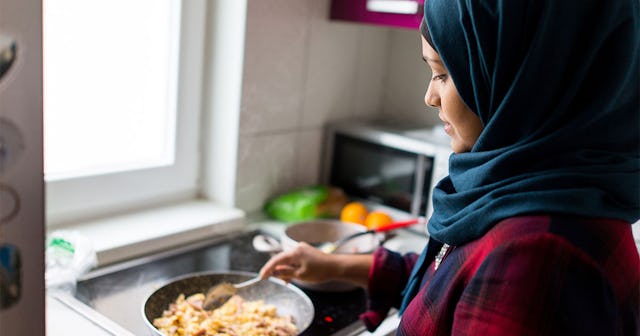Anorexia Only Affects Teenage Girls, And Other Myths

My journey with disordered eating started when I was a freshman in high school. I had a pervasive feeling of not fitting in…of being a misfit. And such began a very long road of starvation, compulsive exercising, laxative abuse, daily weigh-ins, etc. My eating disorder became a source of comfort for me – I even once described it to a therapist as my security blanket. If life ever felt out of control, I could retreat to a place where I was in control. Or so I thought. The irony, though, is my eating disorder was always in control and I was often spiraling.
Fast forward to adulthood, marriage, and three healthy kids. Now in my mid-40s, I hadn’t had any disordered eating thoughts in many, many years. It was something that hadn’t even entered my mind. Until I saw a picture of myself from my younger sister’s wedding. And I hated it. I thought I looked terrible, especially compared to my thinner sisters. And that was enough for the switch to flip in my head and my eating disorder to come out of hibernation to tell me “well, you know what to do.”
I immediately started restricting calories. It always starts off slowly … instead of a whole yogurt for breakfast, just eat half. Then eat nothing. Eat a smoothie and some almonds for lunch. Then eliminate the almonds. I started weighing myself daily. I expected to see that number go down every day and was disappointed when it didn’t. I felt like a failure and I obviously needed to try harder. Which meant eating even less.
Out of nowhere I became consumed with counting calories … determining what I was “allowed” to eat. Avoiding carbs and sugar like they were as dangerous as heroin. Of course, the weight came off, and quickly. And people started noticing and complimenting me. Which, pardon the pun, feeds the beast of the eating disorder. “You think I look good now, wait until I lose another 10 pounds.”
It wasn’t just enough for me to restrict calories and compulsively exercise, I started abusing laxatives again too. Especially if I felt guilty about what I ate the night before. My husband and I attended a fundraiser for the board he sits on and it was the first time in a long time I felt out of control of what I had to eat – I didn’t have a choice but to eat what they were serving. I left the fundraiser that night feeling huge and fat and disgusting. Before I went to bed that night I took four laxatives to make sure my body was going to get rid of that food.
Of course, my husband asked what was going on, if was I okay. He asked if I was using laxatives, as he knew I had done so in the past. I lied to his face and told him no. I would actually hide the empty laxative packages in shoe boxes in my closet so he wouldn’t find them. One day my seven-year-old daughter was trying on my shoes and she found them. She asked what they were and I lied and told her they were vitamins. That was a pretty low moment for me as a mother.
Over the course of just a few months I had lost 40 pounds. None of my clothes fit. I was having chest pains and dizzy spells. I was having a hard time sitting through meetings at work and focusing on my job.
And people started getting concerned and talking. A couple of people asked my husband if I was okay. My older son told me I looked weird because I was so thin. My daughter asked me why I never ate the desserts we baked together. Those were very sobering moments for me.
I knew I needed help because, mentally, I wasn’t able to snap myself out of these habits. I met with a clinician at a non-profit that specializes in providing resources and support to people struggling with eating disorders. She told me that the youngest person she’s ever met with one was eight years old and the oldest was 81. And she also told me that, based on what I shared with her, I should take a leave of absence from work and admit myself to a partial hospitalization program.
To say that those words felt like a punch in the gut is a drastic understatement. I thought she would give me the names of some therapists and nutritionists and I’d be on my merry way. I felt so ashamed. Here I am, in my mid-40s with a successful career and raising three kids. How did I let things get to this point? Shouldn’t I have my shit together at this point in my life? I felt like a weak and damaged human being.
I cried the whole way home from my meeting with the clinician, but then I thought “fuck this.” I’m not going to let my eating disorder take me away from my kids. I was going to flip that switch back no matter what it took.
I found an amazing nutritionist who I truly credit with saving my life. It took a while for my mindset to shift and for my eating disorder voice to quiet down. It wasn’t a seamless process … there were slip-ups, there were tears, there were a lot of emotionally and physically uncomfortable moments. But through that journey I have learned to better trust my body, to enjoy food again, eat homemade cookies with my daughter, and hopefully set a better example for my children.
This article was originally published on